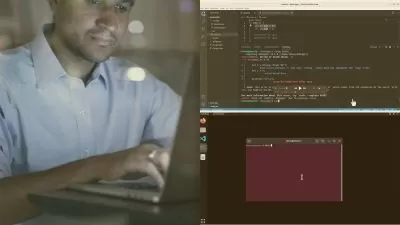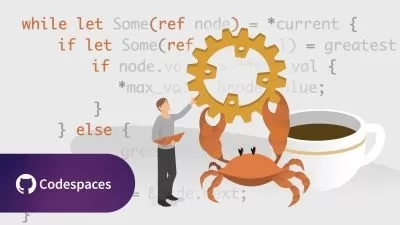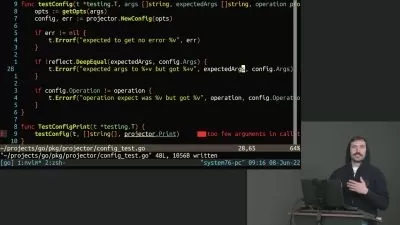1. Learn Rust programming.mp4
00:51
2. What you should know.mp4
01:16
3. What is Rust-.mp4
04:10
4. Installing Rust on Windows.mp4
04:10
5. Installing Rust on Linux and macOS.mp4
01:51
6. Anatomy of a Rust program.mp4
05:54
7. Adding comments.mp4
02:59
8. Building programs using Cargo.mp4
06:44
9. Declaring variables.mp4
05:46
10. Integer data types.mp4
06:51
11. Floating-point data types.mp4
05:34
12. Arithmetic operations.mp4
06:37
13. Formatting print statements.mp4
04:56
14. Bitwise operations.mp4
10:46
15. Boolean data type and operations.mp4
05:04
16. Comparison operations.mp4
03:05
17. Char data types.mp4
02:36
18. Challenge- Find the average.mp4
01:17
19. Solution- Find the average.mp4
02:01
20. Arrays.mp4
07:43
21.Multidimensional arrays.mp4
04:33
22. Tuples.mp4
04:36
23. Function parameters.mp4
06:37
24. Statements vs. expressions.mp4
01:49
25. Function return values.mp4
05:08
26. Challenge- Convert temperature.mp4
01:25
27. Solution- Convert temperature.mp4
01:12
28. Conditional execution.mp4
03:38
29. Multiple conditions.mp4
03:45
30. Conditional assignment.mp4
03:41
31. Loops.mp4
03:45
32. While loops.mp4
04:55
33. For loops.mp4
05:09
34. Nested loops.mp4
02:51
35. Challenge- Max, min, mean.mp4
01:13
36. Solution- Max, min, mean.mp4
02:25
37. Variable scope.mp4
02:52
38. Shadowing variables.mp4
03:47
39. Stack and heap memory.mp4
05:07
40. String data type.mp4
04:48
41. Ownership.mp4
03:47
42. Moving, cloning, and copying data.mp4
07:02
43. Transferring ownership.mp4
06:33
44. Borrowing references.mp4
04:08
45. Mutable references.mp4
02:58
46. Dangling references.mp4
02:25
47. Slices.mp4
04:43
48. Slices as function parameters.mp4
04:44
49. Challenge- Trim spaces.mp4
01:28
50. Solution- Trim spaces.mp4
02:41
51. Rust Standard Library and prelude.mp4
03:19
52. Standard input.mp4
02:06
53. Parse strings.mp4
03:24
54. Crates.mp4
06:31
55. Challenge- Higher or lower.mp4
01:05
56. Solution- Higher or lower.mp4
03:59
57. Command-line arguments.mp4
04:48
58. Reading from files.mp4
04:44
59. Writing to files.mp4
04:55
60. Challenge- Check the roster.mp4
01:08
61. Solution- Check the roster.mp4
02:24
62. Defining structs.mp4
05:38
63. Struct update syntax.mp4
03:42
64. Struct methods.mp4
03:58
65.Associated functions.mp4
02:30
66. Tuple structs.mp4
03:51
67. Challenge- Represent shapes.mp4
01:29
68. Solution- Represent shapes.mp4
02:21
69. Generic struct definitions.mp4
05:39
70. Generic method definitions.mp4
03:48
71. Generic function definitions.mp4
03:26
72. Box data type.mp4
06:24
73. Challenge- Sum boxes.mp4
01:13
74. Solution- Sum boxes.mp4
02:37
75. Implement traits.mp4
04:33
76. Default trait implementation.mp4
01:33
77. Derive traits.mp4
03:58
78. Trait bounds.mp4
03:08
79. Multiple trait bounds.mp4
04:26
80. Return types with implemented traits.mp4
03:40
81. Challenge- Implement the display trait.mp4
01:16
82. Solution- Implement the display trait.mp4
01:53
83. The borrow checker.mp4
04:13
84. Lifetime annotation syntax.mp4
06:05
85. Multiple lifetime annotations.mp4
02:32
86. Lifetime elision rules.mp4
05:18
87. Struct lifetime annotations.mp4
04:20
88. Static lifetime.mp4
01:38
89. Define enums.mp4
03:43
90. Match operator.mp4
02:43
91. Match with default placeholder.mp4
04:34
92. Enum methods.mp4
03:04
93. Option-T- enum.mp4
05:15
94. Matching Option-T-.mp4
01:31
95. If-let syntax.mp4
01:57
96. Challenge- Represent a location.mp4
01:04
97. Solution- Represent a location.mp4
01:20
98. Unrecoverable errors.mp4
04:56
99. Result-T, E- enum.mp4
04:19
100. Matching Result-T, E- to recover from errors.mp4
03:21
101. Propagating errors.mp4
03:37
102. Challenge- Handle errors.mp4
01:08
103. Solution - Handle errors.mp4
01:56
104. Vectors.mp4
04:54
105. HashMaps.mp4
06:33
106. Challenge- Count words.mp4
02:23
107. Solution- Count words.mp4
03:34
108. Where to go next.mp4
02:27
Ex Files Rust Essential Training.zip










